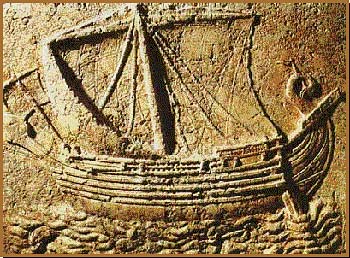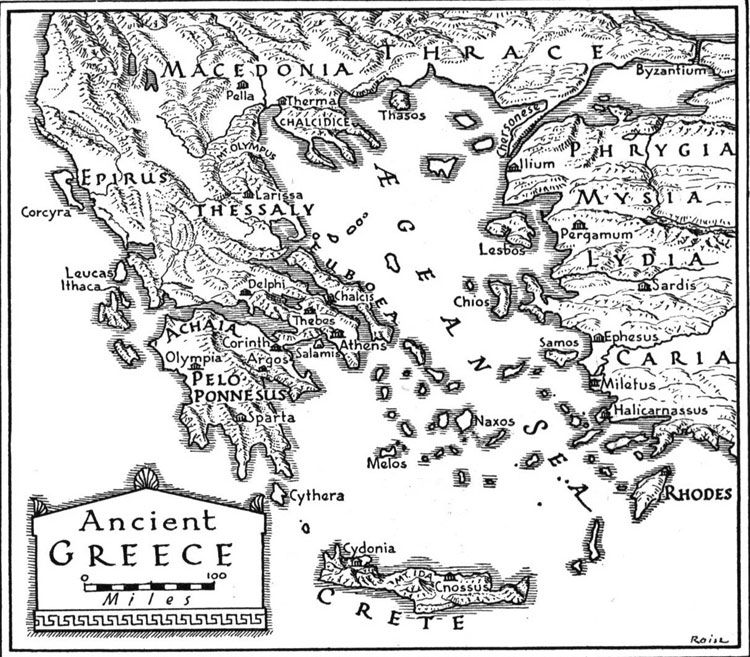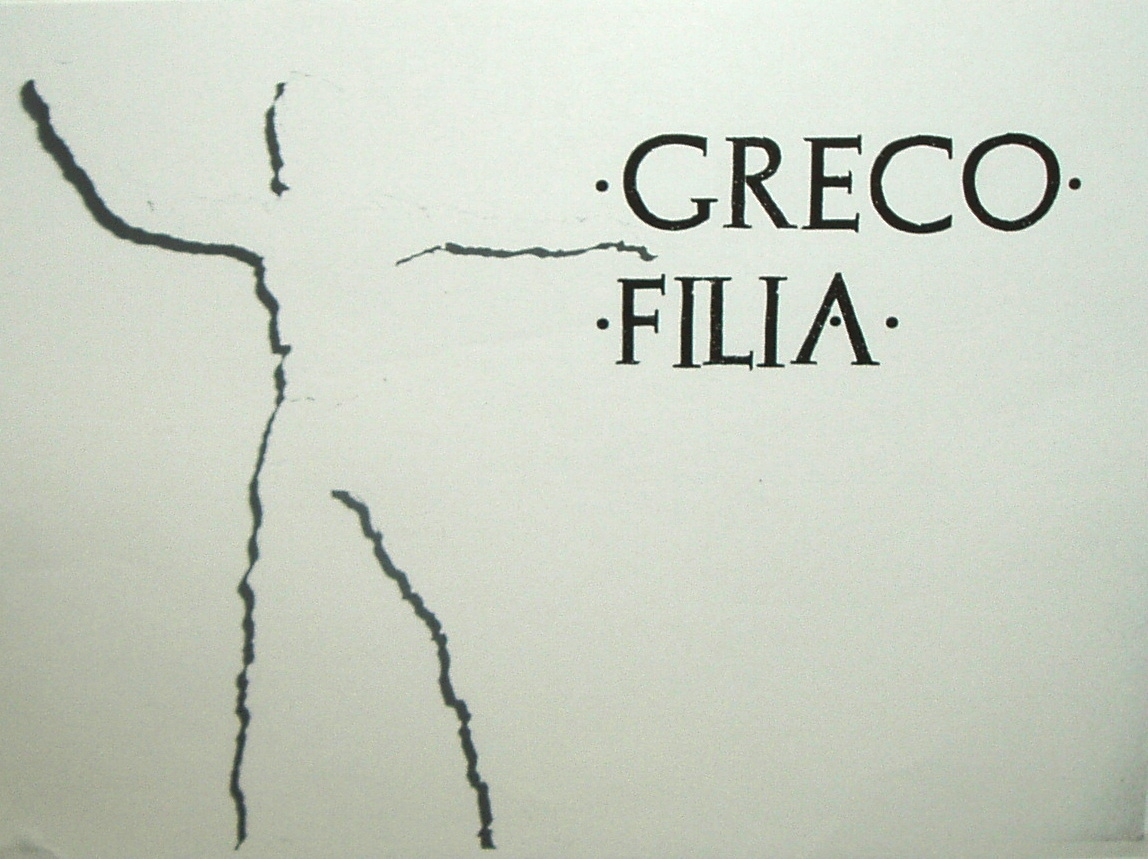Creation and copyright of map by gnto
...and home to a beautiful people...
It would be my first long voyage. At last I was old enough and now the time had come for me to join my father and learn his trade. We would be away from Albion for many months, maybe a year. Father said it would be hazardous but a great adventure that would be the making of me.
We would cross the Great Sea, as far as Alasiya, Byblos and maybe all the way to Greece. He wanted to strengthen links and make trade for fine weavings, linen garments, papyrus, potteries, wine, gold and silver, all in exchange for our precious currency, our cargo of tin.
We made our journey aboard a sturdy trading galley, the Polias, which was on its way home to distant Greece.There was one night, cold and clear, when we huddled to keep warm on the creaky old stern and we were joined by a man known as Pythias, a Greek mathematician. I asked this man, if he might tell us about his people, those who live in that strange and distant land to which we were headed. For myself, I knew very little of the place except for the usual myths and exaggerations told around our fire at home and I wanted to know the truth.
At first he made no reply and I thought he'd missed my words, for the wind tore away everything not tied down. My father nudged my arm and slightly shook his head so I'd bear some respect for the stranger. And so we sat in stillness for what seemed like an age, all deafened by the sea. Pythias sat with his face turned toward the moon, his long hair whipping round his head, whilst she returned his gaze, serene and calm, in silent meditation.
Then, the moonlight in his eyes, he refilled our cups, 'Well now, where shall I begin? Sit and wrap yourselves warm while I give it some mind.' He looked back at the lady moon, took a sip, raised his cup and smiled before he began to tell.

'My friends, the land of Greece is a land to be loved. It is very beautiful. Everywhere you can see the lines of its snow-peaked mountains looking at each other across smiling valleys. Through those valleys sparkle small rivers. Beside the rivers stretch green olive groves, golden wheat-fields, and gardens. Here and there, among the fields, people make communities and their neat houses shine white against the fields. From the foot of the mountain down to the flat valley, lay hills, great and small. Their sides are streaked with vineyards and dotted with white-washed cabins. On the mountain-side, sheep stray watched by their shepherd who pipes to himself in a cool cave. Every mountain-top looks off to the purple sea near at hand. The sea is always dotted with ships and with fishing boats.
Up and down these islands and valleys and hillsides walk my beautiful Greeks. What makes them beautiful? Their smooth skins, well rubbed with olive oil, their muscles trained in the gymnasium, their shining eyes, happy with looking upon sea and mountain, statue and temple - and their clothes help too, for these are in bright colours and hang in gently moving folds. The busy vine-grower among his grapes, the shepherd upon the rough mountain, the sailor on his ship, the carpenter in his shop, they all wear chitons, that leave arms and legs bare and free. In the cool evening they clasp their capes about their shoulders. In the hot sun they tie broad hats upon their heads. For a walk on a stony road they tie open sandals under their feet. The idle gentlemen of the larger towns and cities throw about themselves 'himatons' - great shawls of thin wool or linen that fall in soft folds from neck to feet. The women wear long, loose robes of the same sort.
Above this lovely land and caring for it, are the gods. They live on Mount Olympus, a shining city atop the highest mountain in the whole of Greece and standing in far off Pieria. A golden wall, with clinging gates, encloses it. Inside are sloping green meadows, sprinkled with wonderful flowers. Standing among the grass and flowers are houses of gold and silver, the homes of the gods. On a little hillock is a golden throne. Here sits Zeus, king of the gods, the lord of the world. By his side sits Hera, his queen. Around him stand the company of gods, looking down upon the world.
Apollo the beautiful, Athene in her armour of bronze overseeing the battles, teaching the women to weave and the men to work with tools. Poseidon maker and calmer of sea storms, Hermes who sends gentle winds to carry ships and carry messages through the air for Zeus. There is the boy-god, Dionysus, sender of dew and warmth to ripen the grapes, and Artemis who drives the silver chariot of the moon and the blacksmith god, Hephaestus, whose golden statues can walk and talk and then there is Ares, the fierce god of war and Demeter who ripens the grain of the world.
All these gods are like men and women, but taller, more beautiful and more wonderful. They can never die. Their eyes look to the farthest edges of the world. No man can hide from them. They pass through the sky as quickly as thought. In the wink of an eye they can change from a god to a ragged shepherdlad or an eagle. Life is light and easy for them. And yet they have work to do.
If Apollo is idle, plants and people will die in the darkness. If Hera forgets to visit the earth, no little babies will come to happy parents. If Dionysus is neglectful, the grape-vines and the pomegranate trees and the melon vines all over the world will die and the people would be hungry for fruit and thirsty for wine. If Poseidon was ever angry and left the sea to storm, thousands of galleys would be wrecked and sailors drowned. So the gods are a busy power, sweeping about all over Greece, city to city, field to field and sea to sea and back to Olympus to rest and feast and play. But they take care that the people, save the favoured few to whom they occasionally appeared, do not see them on those visits.
There was a time when the good people down in the world, with their love for these gods who showed such kindness, wished to thank them. They wished to make them gifts. But they could not think how to do it for they rarely saw their gods during their visits to the earth. Neither did they know what to send.
'The gods do not eat common food,' they said, 'but the sweet odours of the world are pleasant to them. Would they not like a taste of this meat and these fruits that they have given us? How shall we send them so far?'
Then they saw the smoke rising above the fire, above the house-top, above the trees and up into the sky. 'Why, that is the way,' they said.
So they built fires on little piles of earth. They soaked the sods with sweet-smelling wine. They put meat and fruits into the fires. The smoke caught the odours of the wine, of crisping meat, and of toasting fruits, and swirled them up through the sky to Mount Olympus. Then the gods breathed in these aromas and smiled down upon the blazing altars and the lifted hands.
Some built marble houses, or temples, round these altars. Here the gods could come to rest from their work in the world. Here people could come to bring gifts to the gods.
So in such a land, live the Greeks, a beautiful people, within the gaze of their gods, and I believe we always shall, my friend.'
Then he reached up as if taking the moon in his hand and he placed it on his heart.
Inspiration from dear Jennie Hall
l
www.grecofilia.co.uk
©2019 - PERMISSION TO COPY. The content of this website is the Copyright of Tony Brown and is protected by international copyright law. You are welcome to copy it for personal or non profit, or educational purposes only and you have my permission to do so, provided it is copied and re-published in it's entirety complete with copyright notice and website address. If you wish to copy it for electronic publication on an intranet, website, blog or Newsletter you may do so provided the article is copied and re-published in it's entirety with all html, copyright information and hyperlinks intact and unaltered in any way with no redirects. If you wish to copy it for any other purpose please contact me for permission first.
...such a very strange land...

